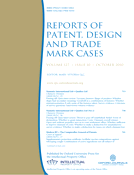 |
| Neurim's conduct was found, on the facts, not to be a "baa" to patent extension |
To cut a long story short (the full tale is there for all to read on Michael's weblog), Unipharm opposed the patent term extension of Neurim's Circadin patent and Commissioner King was required to consider three issues:
- Whether an extension could lawfully be granted on account of Neurim's inequitable behaviour
- Whether the patent in question was to be considered the “basic patent” under Section 64a of Israel's Patent Law
- Whether Circadin was the first drug containing the active ingredient as required by 64d of the Israel Law
The Commissioner rejected the opposition and extended the patent till 22 April 2017. A large part of the IP Factor report deals with inequitable conduct, in particular the allegation that, in its ex parte application for patent extension, the company had behaved improperly and withheld or suppressed relevant information. The Commissioner confirmed that an applicant was required to behave in an equitable manner, but did not consider that any breach by Neurim of that requirement was sufficient to prevent the extension.



